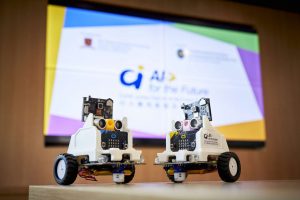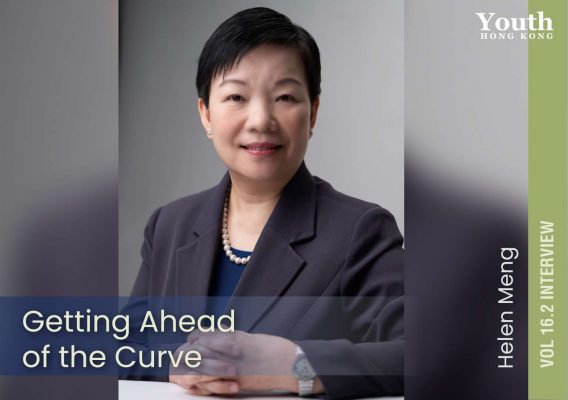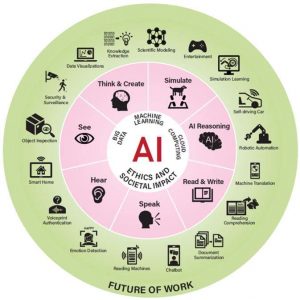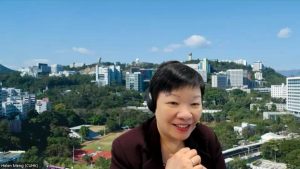//16.2 Interview
Getting Ahead of the Curve
Professor Helen Meng and her team at The Chinese University of Hong Kong share their pioneering efforts in developing Hong Kong’s first comprehensive pre-tertiary AI curriculum to empower young minds.
Just like the other four million Hong Kong residents, Professor Helen Meng often commutes by the MTR. In 2018, during her routine commute, she noticed something different. She observed commuters using a chatbot developed by the Hong Kong MTR to ask for directions and optimal train routes. This AI-enabled chatbot provided passengers with personalised feedback, immediately solving their daily traffic queries.
From her daily commute, Professor Meng began pondering how the Hong Kong population interacts with AI, often without even realising it.
“I wonder how many of us, especially the younger generation, are aware of our interactions with AI every day?” Professor Meng, who conducts research in the fields of human-computer interaction, as well as speech and language technologies, at The Chinese University of Hong Kong (CUHK), told Youth Hong Kong.
In 2019, the CUHK launched its first undergraduate degree in Artificial Intelligence: Systems and Technologies. Professor Meng thought it would be an interesting challenge to teach AI fundamentals to pre-tertiary students, not only to spark their interest, but to pave the way for their future education and careers.
Testing the Curriculum
To challenge the conventional approach of offering AI subjects only at the undergraduate and postgraduate levels, Professor Meng, along with key members from multiple departments, launched a new AI curriculum for secondary school students in Hong Kong in September 2019, funded by the Hong Kong Jockey Club Charities Trust. This three-year project is part of the CUHK Jockey Club AI for the Future Project.
A first of its kind, this AI, pre-tertiary curriculum, with 12 chapters and 55 modules, was co-created by the CUHK Faculty of Engineering, and Faculty of Education and selected pioneering Hong Kong schools that prioritise technology education. It introduced AI and the crucial drivers of its recent rapid development, such as big data, machine learning, and cloud computing. Another key component was ethics and societal impact, using case studies to understand how AI applications could promote social good.
The curriculum also linked these important components with human senses like seeing, hearing, simulating and reasoning, and taught students real-life AI applications such as smart homes, voiceprint authentication, security and surveillance, entertainment, self-driving cars and chatbots.
Another highlight of the curriculum was the interactive e-learning platform for students, which provided teacher training and support, such as open classes and workshops, to ensure teachers are well-equipped to deliver complex AI concepts to students in an engaging and accessible way.
After developing and assessing the curriculum, as well as receiving feedback from diverse stakeholders, including teachers, students, and AI experts, and experimenting with the AI curriculum in more than 200 participating schools, key elements of the project will be integrated into the Education Bureau’s Curriculum Modules on Innovation and Technology Education for junior secondary level, starting September 2024.
“Hong Kong is not lagging behind and has been keeping pace with global trends.”
Until recently, the emergence of powerful Generative AI applications that create human-like content, has automated a considerable amount of work for humans, raising worries on the ethical use of those tools, especially among students. Governments, schools and teachers are now being pushed to consider AI as a new subject area for K-12 schools worldwide.
Globally, the current practices of developing and implementing AI curricula in primary and secondary school education look promising and many have introduced AI education programmes at various levels. Countries like China, Singapore, India, South Korea, Portugal and Germany have all developed, endorsed and implemented AI curricula in secondary school education. Hong Kong is not lagging behind and has been keeping pace with global trends.
From Working Solo to Collaborative Efforts
Such a comprehensive and evolving curriculum could not be achieved by one person alone. Professor Meng has always been grateful for the collective efforts and dedication of the diverse team. At the outset, she would take extra time to work every weekend night to select the AI class topics and develop the fundamental concepts of AI in 2019, but very soon, she was able to rapidly grow the curriculum team with contributors from diverse backgrounds joining in to make this curriculum a reality.
Apart from having world-class academics in AI disciplines, Professor Meng also invited many undergraduates majoring in artificial intelligence, engineering and computer science, all of whom are interested in education, to contribute to different aspects of the curriculum. She furthermore turned to colleagues in the Education Department to seek their expertise on how to engage secondary school teachers and students.
“I must confess, I only know how to teach students aged 18 and above, and I don’t have much experience teaching younger students,” the professor said, laughing, “so it was important to have this co-creation between the Engineering and Education Departments to ensure our curriculum follows the right pedagogical approach and the content could catch the attention of students and be effectively delivered in secondary schools.”
The collaboration did not end there. A diverse group of secondary schools in Hong Kong joined the pilot AI curriculum. During the experimental period, the Project team would meet with the teachers from participating schools every couple of weeks to present the latest updates on the curriculum, gather feedback from teachers about the teaching sessions, and then refine the curriculum content to make it engaging and accessible for the students.
Through this collective process, the teachers not only learnt a lot and became well versed in delivering AI concepts, but they also offered open classes to share their experiences with other teachers on technology education.
Evolving for the Future
The multidisciplinary nature and targeting of a younger audience are only part of the challenges at this developmental stage. Moreover, the content, in the format of open teaching resources instead of textbooks, has to be constantly updated to keep up with the constant and rapid advancement of technology.
Years before the breakout year of Generative AI, there was already a slot for it in the curriculum framework covering natural language processing and language generation, the roots of generative AI models. “The widespread adoption of Generative AI has motivated us to bring it into sharper focus, as it aligns with our existing broad coverage,” said Meng.
“We are not just writing a static curriculum. We have capable colleagues who are leading the latest advancements in technology and consistently staying abreast of new developments, enabling us to keep our curriculum dynamic and relevant,” she said.

The new AI curriculum for secondary school students in Hong Kong is funded by the Hong Kong Jockey Club Charities Trust.
As the official launch of the AI curriculum in secondary schools approaches, Professor Meng looked back at the pilot phase and is delighted to see how AI education prompts students to develop critical thinking on the capabilities and limitations of AI. She remembered one instance where students, when discussing the classic ethical dilemma “trolley problem,” started to think deeply about the ethical burden on the programmer or manufacturer of the self-driving car.
The AI curriculum is also part of a broader vision that Professor Meng and Hong Kong are striving to achieve – talent cultivation. She believes digital literacy, especially AI literacy, is key to leveraging Hong Kong’s human capital. Training professionals in AI technologies is essential for industries that are the pillars of Hong Kong’s economy.
“We are not writing a static curriculum.”
Speaking of the purpose of offering AI courses, Professor Meng hopes to get students more interested and comfortable about learning AI. “This is at least what we can achieve initially. As they learn more about AI, they must understand that technology is not perfect, and that it will not dictate their lives. They need to know what AI can and cannot do, when AI may fail, when AI may not meet expectations, and when AI can be misused and cause harm. By gaining this understanding, students can approach AI with a balanced and informed perspective,” she added.
If AI technologies can continue to be democratised and teachers can make good use of them in the classroom, she believes those powerful tools are going to inspire people and enhance learning by a great deal. “With a strong ethical foundation and the confidence to learn new things, they will be able to make the world a better place.” ■




